Our Resources
Our parenting philosphy has been influenced and inspired by the best tried and tested methods and the latest research on parenting. You will find below some of the books and research that have inspired us.

As the parents of three children, struggling like so many others to find a balanced and effective parenting style, we turned away from all the parenting fads and studied the hard scientific evidence on what really works. The techniques we learnt were so life changing, yet so straightforward, that we made it our mission to convert them into powerful step by step tools and make them available to parents world over. Read more about the philosophy behind Best of Parenting.


As the parents of three children, struggling like so many others to find a balanced and effective parenting style, we turned away from all the parenting fads and studied the hard scientific evidence on what really works. The techniques we learnt were so life changing, yet so straightforward, that we made it our mission to convert them into powerful step by step tools and make them available to parents world over. Read more about the philosophy behind Best of Parenting.


Our parenting philosphy has been influenced and inspired by the best tried and tested methods and the latest research on parenting. You will find below some of the books and research that have inspired us.





 |
Parenting Styles: The Four Parenting Styles | |
| By Kendra Cherry | About.com, Psychology | ||
 |
Parenting Styles | |
| By Kathryn Wentzel And Shannon Russell | Education.com |
 |
How Not to Talk to Your Kids: The inverse power of praise | |
| By PO Bronson | NYMAG.com | ||
 |
Praising Children for Their Personal Qualities May Backfire, New Research Finds | |
| American Psychological Association | ||
 |
The art of praising children, and knowing when not to | |
| By Ally Fogg | The Guardian | ||
 |
Children with low self-eteem could be harmed if they are lavished with too much praise by parents, study claims | |
| By Richard Garner | The Independent | ||
 |
Positive Reinforcement: 9 Things You Shouldn’t Say to Your Child | |
| By Paula Spencer | Parenting.com |
 |
Temper Tantrums in Young Children | |
| By M.Poetgal & R.J.Davidson | Lab For Affective Neuroscience | ||
 |
Why Toddlers Throw Temper Tantrums | |
| By Patty Onderko | Parenting.com | ||
 |
Terrible Twos Who Stay Terrible | |
| By David Dobbs | NYTimes:Well |
 |
Time-Out, Punishment, and Time-Away |
| By B.Kaiser | J.S Raminsky | Education.com |
 |
Avoiding the parent trap |
| By Lynne Shallcross | Counseling Today |
 |
Why Spanking Doesn’t Work | |
| By Bonnie Rochman | Time.com | ||
 |
Spanking hurts kids in the long run, too | |
| By Michael Mackenzie | CNN Parents |
 |
Extrinsic Rewards Undermine Altruistic Tendencies in 20-Month-Olds |
| By F.Warneken And M.Tomasello | American Psychological Association |
 |
The Neuroscience of Positive Discipline |
| By Stphanie Tam Rosas | Positive Discipline Community |
 |
Why Parents Need to Let Their Children Fail |
| Jessica Lahey | The Alantic |
 |
When a Parent’s ‘I Love You’ Means ‘Do As I Say’ |
| Alfie Kohn | The New York Times |
 |
Introducing Harley Rotbart’s Developmental Milestones of Parenting |
| Sherry Huang | Parenting.com |
 |
Children Need Touching and Attention, Harvard Researchers Say |
| By Alvin Powell | Harvard university Gazette |
Our parenting philosphy has been influenced and inspired by the best tried and tested methods and the latest research on parenting. You will find below some of the books and research that have inspired us.





 |
Parenting Styles: The Four Parenting Styles | |
| By Kendra Cherry | About.com, Psychology | ||
 |
Parenting Styles | |
| By Kathryn Wentzel And Shannon Russell | Education.com |
 |
How Not to Talk to Your Kids: The inverse power of praise | |
| By PO Bronson | NYMAG.com | ||
 |
Praising Children for Their Personal Qualities May Backfire, New Research Finds | |
| American Psychological Association | ||
 |
The art of praising children, and knowing when not to | |
| By Ally Fogg | The Guardian | ||
 |
Children with low self-eteem could be harmed if they are lavished with too much praise by parents, study claims | |
| By Richard Garner | The Independent | ||
 |
Positive Reinforcement: 9 Things You Shouldn’t Say to Your Child | |
| By Paula Spencer | Parenting.com |
 |
Temper Tantrums in Young Children | |
| By M.Poetgal & R.J.Davidson | Lab For Affective Neuroscience | ||
 |
Why Toddlers Throw Temper Tantrums | |
| By Patty Onderko | Parenting.com | ||
 |
Terrible Twos Who Stay Terrible | |
| By David Dobbs | NYTimes:Well |
 |
Time-Out, Punishment, and Time-Away |
| By B.Kaiser | J.S Raminsky | Education.com |
 |
Avoiding the parent trap |
| By Lynne Shallcross | Counseling Today |
 |
Why Spanking Doesn’t Work | |
| By Bonnie Rochman | Time.com | ||
 |
Spanking hurts kids in the long run, too | |
| By Michael Mackenzie | CNN Parents |
 |
Extrinsic Rewards Undermine Altruistic Tendencies in 20-Month-Olds |
| By F.Warneken And M.Tomasello | American Psychological Association |
 |
The Neuroscience of Positive Discipline |
| By Stphanie Tam Rosas | Positive Discipline Community |
 |
Why Parents Need to Let Their Children Fail |
| Jessica Lahey | The Alantic |
 |
When a Parent’s ‘I Love You’ Means ‘Do As I Say’ |
| Alfie Kohn | The New York Times |
 |
Introducing Harley Rotbart’s Developmental Milestones of Parenting |
| Sherry Huang | Parenting.com |
 |
Children Need Touching and Attention, Harvard Researchers Say |
| By Alvin Powell | Harvard university Gazette |
Our parenting philosphy has been influenced and inspired by the best tried and tested methods and the latest research on parenting. You will find below some of the books and research that have inspired us.
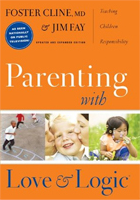
This parenting book shows you how to raise self-confident, motivated children who are ready for the real world. Learn how to parent efficiently while teaching your children responsibility and growing their character. establish healthy control through easy-to-implement steps without anger, threats, nagging, or power struggles. Indexed for easy reference.
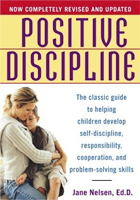
For twenty-five years, Positive Discipline has been the gold standard reference for grown-ups working with children. Now Jane Nelsen, distinguished psychologist, educator, and mother of seven, has written a revised and expanded edition. The key to positive discipline is not punishment, she tells us, but mutual respect.
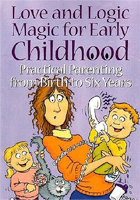
Practical Parenting from Birth to Six Years Let Jim Fay and Charles Fay, Ph.D., help you start your child off on the right foot. The tools in Love and Logic Magic for Early Childhood will give you the building blocks you need to create children who grow up to be responsible, successful teens and adults.
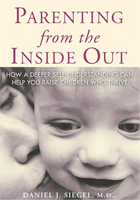
Child psychiatrist Daniel J. Siegel, M.D., and early childhood expert Mary Hartzell, M.Ed., explore the extent to which our childhood experiences actually do shape the way we parent, drawing upon stunning new findings in neurobiology and attachment research, they explain how interpersonal relationships directly impact the development of the brain.
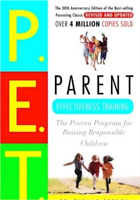
P.E.T., or Parent Effectiveness Training, began almost forty years ago as the first national parent-training program to teach parents how to communicate more effectively with kids and offer step-by-step advice to resolving family conflicts so everybody wins.
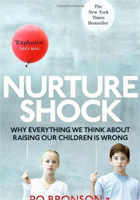
In a world of modern, involved, caring parents, why are so many kids aggressive and cruel? Where is intelligence hidden in the brain, and why does that matter? Why do cross-racial friendships decrease in schools that are more integrated? If 98% of kids think lying is morally wrong, then why do 98% of kids lie?
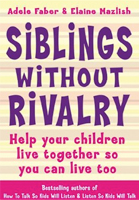
Having children is wonderful, but they can seriously endanger your sanity. Faber and Mazlish have written a comprehensive guide with practical guidelines and examples for how to cope with – and deflect – sibling rivalry. Written with humour, understanding and compassion
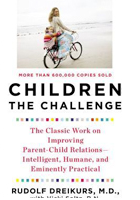
Children:The Challenge gives the key to parents who seek to build trust and love in their families, and raise happier, healthier, and better behaved children. Based on a lifetime of experience with children–their problems, their delights, their challenges– Dr. Rudolf Dreikurs, presents an easy to follow program that teaches parents how to cope
 |
Parenting Styles: The Four Parenting Styles | |
| By Kendra Cherry | About.com, Psychology | ||
 |
Parenting Styles | |
| By Kathryn Wentzel And Shannon Russell | Education.com |
 |
How Not to Talk to Your Kids: The inverse power of praise | |
| By PO Bronson | NYMAG.com | ||
 |
Praising Children for Their Personal Qualities May Backfire, New Research Finds | |
| American Psychological Association | ||
 |
The art of praising children, and knowing when not to | |
| By Ally Fogg | The Guardian | ||
 |
Children with low self-eteem could be harmed if they are lavished with too much praise by parents, study claims | |
| By Richard Garner | The Independent | ||
 |
Positive Reinforcement: 9 Things You Shouldn't Say to Your Child | |
| By Paula Spencer | Parenting.com |
 |
Temper Tantrums in Young Children | |
| By M.Poetgal & R.J.Davidson | Lab For Affective Neuroscience | ||
 |
Why Toddlers Throw Temper Tantrums | |
| By Patty Onderko | Parenting.com | ||
 |
Terrible Twos Who Stay Terrible | |
| By David Dobbs | NYTimes:Well |
 |
Time-Out, Punishment, and Time-Away |
| By B.Kaiser | J.S Raminsky | Education.com |
 |
Avoiding the parent trap |
| By Lynne Shallcross | Counseling Today |
 |
Why Spanking Doesn't Work | |
| By Bonnie Rochman | Time.com | ||
 |
Spanking hurts kids in the long run, too | |
| By Michael Mackenzie | CNN Parents |
 |
Extrinsic Rewards Undermine Altruistic Tendencies in 20-Month-Olds |
| By F.Warneken And M.Tomasello | American Psychological Association |
 |
The Neuroscience of Positive Discipline |
| By Stphanie Tam Rosas | Positive Discipline Community |
 |
Why Parents Need to Let Their Children Fail |
| Jessica Lahey | The Alantic |
 |
When a Parent's 'I Love You' Means 'Do As I Say' |
| Alfie Kohn | The New York Times |
 |
Introducing Harley Rotbart's Developmental Milestones of Parenting |
| Sherry Huang | Parenting.com |
 |
Children Need Touching and Attention, Harvard Researchers Say |
| By Alvin Powell | Harvard university Gazette |